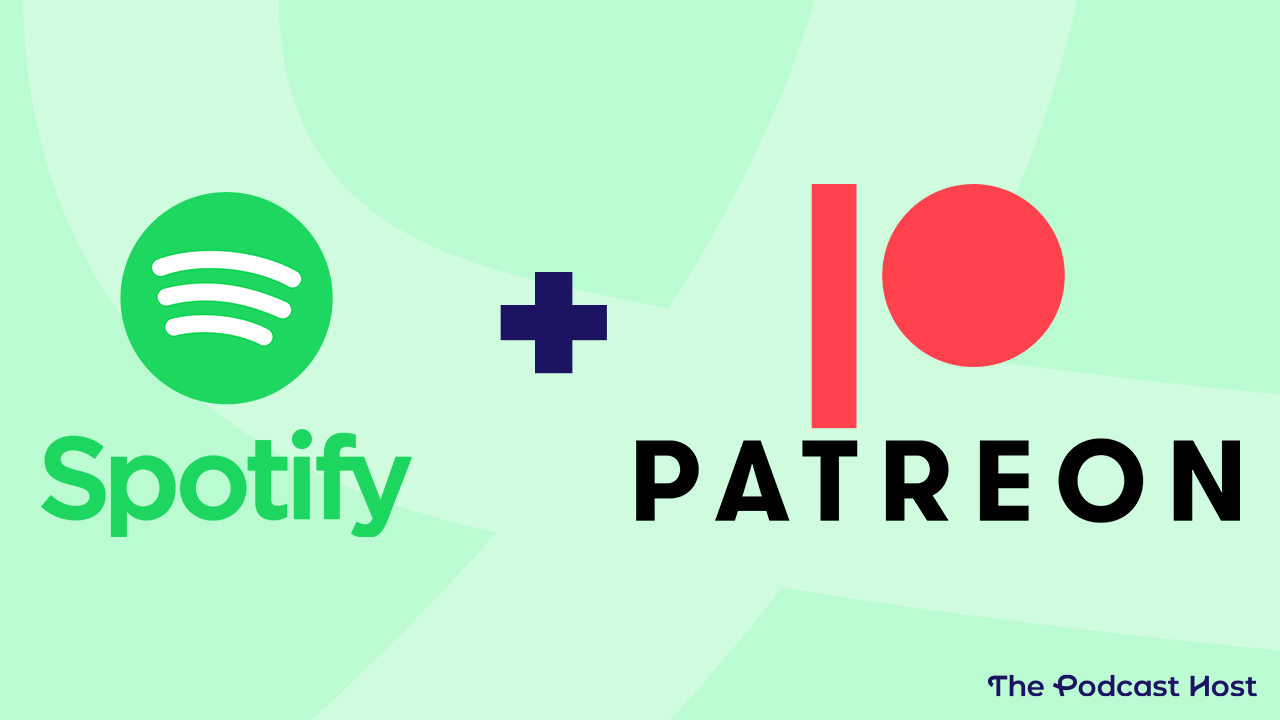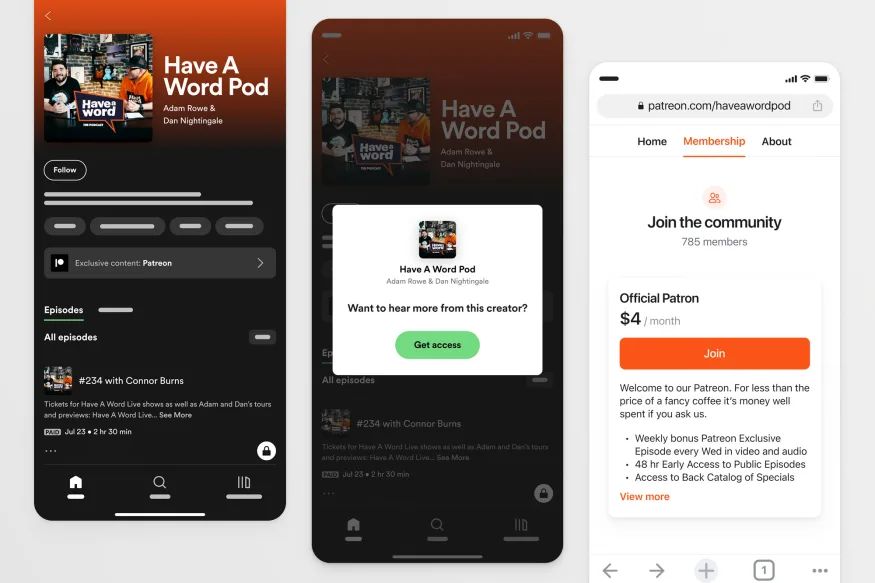Spotify x Patreon Integration: How Excited Should Podcasters Be?

So you probably heard that Spotify and Patreon have partnered to launch an integration. This news means podcasters can now automatically pull their subscriber-only content from Patreon and make it available on Spotify to a whole lot more listeners.
If you’re a podcaster who uses both of these platforms to share your content, you’ll be pleased to hear this. More ears on your exclusive content means more opportunities to monetise.
Clearly, this new integration has its perks. But there are a few things to be aware of – and even cautious about – if you’re going to go down the route of using it.
Let’s take a quick look at how the integration actually works, and what this new partnership means for independent podcasting.
How the Spotify-Patreon Integration Works

Using the Spotify and Patreon integration is just a matter of linking your Patreon account to your Spotify creator account.
Once your accounts are linked, Patreon-hosted episodes will sync to your Spotify feed. They’ll appear with a lock symbol and a ‘paid’ tag, so listeners can distinguish between free and exclusive content. When someone clicks to listen to a premium episode, a pop-up banner will appear asking if they want to ‘Get access’.
Anyone who clicks the button will be redirected to your Patreon page. There, they can learn how to access your subscriber-only content (aka pay for it).
Reasons to Be Cheerful About This News
Of course, there are many reasons to be happy about an integration like this. In a nutshell, this provides a streamlined way to create and monetise premium podcast content with your listeners.
If you’re already using Patreon for your podcast, you can now promote your premium content to millions of Spotify users. Previously, listeners could only access and listen to Patreon-exclusive content within the Patreon app. Patreon isn’t a listening platform per se, so building it into people’s listening habits isn’t easy. Making this content available on Spotify is undoubtedly going to change that.
If you have listeners who already use Spotify to listen to your show but aren’t aware you have subscriber-only content available on Patreon, this means you can now begin promoting that premium content to them without any extra cost or effort. As Spotify is a well-known brand, it’s likely that listeners will feel comfortable paying for content through the platform, too.
Reasons to Be Cautious of This Integration
So here comes the slightly cynical part of this story…
While this partnership involves two of the biggest tech brands in podcasting, that doesn’t necessarily mean you should blindly throw all your podcast monetisation eggs into this one big newly-integrated basket.
Neither of these companies have done much to give us confidence that they’re stable or reliable players in the podcasting industry in recent years. In fact, they’ve done the opposite.
How Much Can You Trust Patreon?
Just a few years ago, Patreon was involved in a major data leak that saw the personal data of 2.3 million Patreon users released to the public. And how did Patreon respond to this? A few years later, the company ‘parted ways’ with its entire data security team without comment.
And who remembers when Patreon announced it was going to start charging backers a fee for every pledge? The news went down so badly that the plans were never even rolled out.
Earlier this month, Patreon also suddenly decided to switch billing credit cards from the US to billing from Ireland. The move resulted in banks rejecting many transactions as potentially fraudulent. And, as one podcaster discovered, Patreon automatically deletes any subscriptions with patrons that are associated with bounced transactions.
My aim here isn’t to bash Patreon, but to highlight the fact that just because Patreon is a household name doesn’t make it a reliable place to exclusively host your premium content. If Patreon shuts down all operations tomorrow, how can you be sure your exclusive podcast content doesn’t sink along with it?
How Much Can You Trust Spotify?
And while Spotify is undoubtedly one of the most popular podcast-listening platforms nowadays, the company has been creating a lot of unnecessary instability for the industry of late.
Their strategy in the last year has been pretty erratic, to say the least. Hot Pod’s Amrit Kahled recently described it as ‘off the rails’. Spotify threw huge sums of cash at big-name podcasters to secure exclusive deals (The Obamas’ Higher Ground and Where Should We Begin with Esther Perel, for example) only to axe them shortly after.
They also purchased some of the most successful podcast media companies (Gimlet and Parcast) only to quickly downsize them into ‘Spotify Studios’. The move saw 11 exclusive podcasts get the axe. The constant layoffs within the Spotify podcasting team are another red flag, too.
There was one quote in Spotify’s press release about the Patreon integration that I found particularly jarring:
“While some platforms focus on building closed systems that push creators and their fans further apart, Spotify and Patreon are building a more open ecosystem that delivers greater value to everyone, particularly creators and fans.”
Julian Gutman, Chief Product Officer at Patreon
But Spotify’s strategy in recent years has been to sign high-profile shows and lock them exclusively to their platform. That’s not supporting an ‘open ecosystem‘ for podcasting at all. It’s the complete opposite. Sure, Spotify has played a big part in raising the profile of podcasting these past few years, but criticism towards it within the industry is, more often than not, justified.
So, Should I Use the Patreon-Spotify Integration?
Again, I’m not here to say that Spotify and Patreon shouldn’t be part of your podcasting plans. Far from it, in fact. Publishing your content on as many platforms as possible is critical to podcast growth. And there’s no denying it; selling premium Patreon content via Spotify looks like a quick, easy, and mainstream way to earn from your bonus content.
But think carefully before focusing on this as your primary podcast income stream. Sign up, test out, and experiment for sure. You can even dedicate a bit more time to it if it does well, too. But make sure it’s not at the expense of other monetisation avenues you currently have in place. Avenues that are more stable, within your control, and not at the mercy of two pretty unreliable and unpredictable players in the industry.
Are you planning to publish premium Patreon content on Spotify? Let us know how you get on in the IndiePod Community.
